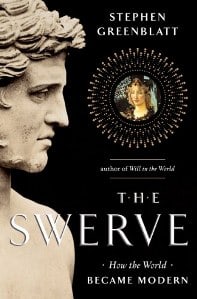Stephen Greenblatt’s book, The Swerve: How the World Became Modern, is an excellently well written book that combines both history and storytelling.
It is a scintillating work of historical fiction that is equal to the Name of the Rose by Umberto Eco. Greenblatt’s book revolves around the life and times of a fifteenth century Florentine/Roman scholar and one time secretary to the Pope, Poggio Bracciolini, and his discovery of a lost poem entitled De Rerum Natura by the first century BC poet Titus Lucretius Carus.
The Swerve strings together the complex weave of religion, society, corruption, greed, immorality, Greek philosophy, war, the lives of monasteries, monks, and libraries to tell the story. This narrative is structured by following Poggio Bracciolini in his pursuits. The Book revolves around Poggio finding this poem which was unknown to civilization for a number of centuries.
He believes that the discovery of this poem written by Lucretius was a cornerstone in the development of humanism and the reshaping of what is now become the modern world.
Greenblatt gives a very vivid picture of the manufacture of books, sales, and the public and private libraries of the fifteenth century which was controlled by the Church and the cultural elite. The Swerve also outlines that the lives of the copyists and book clerks was not always an easy one. As one copyist noted at the completion of a work, Thank God, it will soon be dark, (Page. 40) meaning that his job was done for the day.
It also shows the daily lives of those clerks and administrators in the fifteenth century; their gossip, sexual innuendos, morality and secret lives — a shocking revelation by many readers assuming that those involved within the Church industry would be there for altruistic purposes.
There is one serious flaw with the book and that is of overstatement. The discovery of the poem written by Lucretius has had minimal affect on the shift to humanism as compared to the works of Aristotle and lesser that of Plato — two Greek philosophers who, although never Christian, have always been a central part of Christian rhetoric. This is an important fact left out by Greenblatt.
He also did not credit Greek philosophy as the only way out for a disillusioned society that recognized the greed, wickedness and immorality within their Church leaders. Any negative speech to Church leaders or doctrine could have severe repercussions. Any reference to Islam or Judaism for structural reform also would bring serious penalties. Greek philosophy, a vehicle by which ancient Christian orators have quoted and structured their rhetoric since the inception of the Church, was a tolerated genre. This form of Greek philosophy did not directly cross into the boundaries of Christian theology. There was no direct threat. It was the only alternative that did not immediately commute harsh punishment.
This created a natural outlet for protest and an alternative to the dominant structures of the time. It was inevitable that Greek philosophy would become a much more active force in the years to come.
The Swerve was a Pulitzer prize winner for nonfiction. However this is a historical narrative. His storytelling, which makes it an interesting adventure, is not always historically accurate. In this instance he chose style over substance and did a very good job in doing so. His novel approach is his strength and makes this book a good read. It is given a 4.5 out of 5 for historical fiction and 3 out of 5 for historical nonfiction.
The Swerve: How the Word Became Modern is available at amazon.com, your local bookstore, or library. ■

One of my professors from this Spring told us about this book. As a medievalist he had nothing but disdain for it! If I recall rightly, he couldn’t even finish it. I think http://lareviewofbooks.org/article.php?id=1217&fulltext=1 summed up his complaints pretty well.
Alex Poulos has provided a link to a very good review on this subject and would highly recommend readers to spend a few moments looking at it. The reviewer basically sums it all up in this sentence — “The Swerve presents itself as a work of literary history. But really it is a salvo in the culture wars; an effort to lend an aura of historical inevitability to the idea that religious faith has no place in a modern democratic society.”